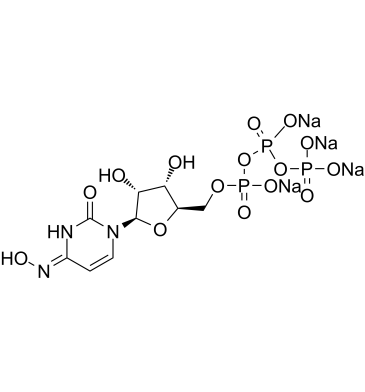NHC-triphosphate tetrasodium |
| Catalog No.GC61961 |
Le NHC-triphosphate tétrasodique est un métabolite intracellulaire phosphorylé actif de la β-d-N4-hydroxycytidine (NHC) sous forme de triphosphate.
Products are for research use only. Not for human use. We do not sell to patients.

Sample solution is provided at 25 µL, 10mM.
NHC-triphosphate tetrasodium is an active phosphorylated intracellular metabolite of β-d-N4-Hydroxycytidine (NHC) as a triphosphate form[1]. NHC-triphosphate tetrasodium is a weak alternative substrate for the viral polymerase and can be incorporated into HCV replicon RNA[1][2].
In an intracellular metabolism assay, HCV replicon cells are treated with 10 µM 3H-labeled NHC, and intracellular nucleotide levels are determined after 1, 2 and 8 hours incubations. NHC is rapidly convered into the mono-, di-, and triphosphate forms, and NHC-TP reaches up to 71.12 pM after 8 hours[1].NHC-triphosphate (NHC-TP) (5-40 µM) absence leads to full-length polymerization products, it can be a weak alternative substrate. In addition, incorporation of NHC-TP instead of CTP increases the molecular weight of the polymerization product by 16 (one extra oxygen) for each event and an obvious electrophoretic shift is observed in cell-free HCV NS5B polymerization reactions[1].Huh-7 cells are incubated with (10-50 µM; 4 h) NHC or a McGuigan phosphoramidate prodrug of NHC. Intracellular levels of the parental compounds and phosphorylated metabolites are measured using LC-MS/MS. Small amounts of NHC-monophosphate (MP) and NHC-diphosphate (DP) can be observed, while NHC-triphosphate remains the most abundant metabolite[2].NHC-triphosphate (NHC-TP) metabolite may directly target the viral polymerase and behave as a nonobligate chain terminator. It plays a prominent role in inhibiting early negative-strand RNA synthesis, either through chain termination or mutagenesis, which may in turn interfere with correct replicase complex formation.
References:
[1]. Stuyver LJ,et al. Ribonucleoside analogue that blocks replication of bovine viral diarrhea and hepatitis C viruses in culture.Antimicrob Agents Chemother. 2003 Jan;47(1):244-54.
[2]. Maryam Ehteshami, et al. Characterization of β-d- N4-Hydroxycytidine as a Novel Inhibitor of Chikungunya Virus.
Average Rating: 5 (Based on Reviews and 6 reference(s) in Google Scholar.)
GLPBIO products are for RESEARCH USE ONLY. Please make sure your review or question is research based.
Required fields are marked with *




















